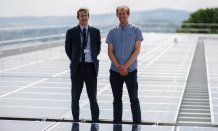Articles

Andy Seaman (Energy Manager) on the left with Gabriel Wondrausch from Sungift Solar. Image courtesy of Rob Coombe.
University sets ambitious carbon reduction target
The University of Exeter has announced a new carbon reduction target that commits to achieving a 50 per cent reduction in energy-related carbon emissions by 2026, and has approved investment in a range of energy-saving projects to help achieve this.
The reduction is to be achieved as a comparison to 2005-06, and takes into account the level of capital expansion expected over this period.
As part of this commitment, the University has approved the first phase of its 2016-2026 Low Carbon Commitment Implementation Plan. This will see investment in a range of projects, which over their lifetime, will save £3.2m on utilities and 4,628 tonnes of carbon - the equivalent to the typical annual carbon emissions of approximately 600 UK households. The projects include, solar PV installations, energy-efficient lighting, upgraded insulation, and boiler replacements, to be delivered over the next two academic years.
Craig Nowell, Director of Campus Infrastructure and Operational Support Services, said: “I am delighted to see the first phase of our ambitious Low Carbon Campus Implementation Plan now under way. The projects being undertaken will deliver significant financial and carbon savings over their lifetime; whilst improving our facilities and having a really positive impact on the University campuses.
“The projects feature many innovative technologies and a diverse range of academic and business partnerships at a local, national and global level. They will see the campuses being increasingly used as a ‘living laboratory’ and demonstrating our commitment to being at both the forefront of research in this area and to operating our campuses in an environmentally responsible manner.”
Andy Seaman, Energy Manager at the University of Exeter, said: “The University has taken many steps in recent years to reduce its carbon emissions and this revised target paves the way for continued improvement. We are committed to reducing our environmental impact and rising to this challenge as the University continues to grow.
“Alongside the financial and carbon savings; these projects will also deliver improvements to building environments that will help make them more comfortable for our staff and students to work and study in. We also value how many small actions make a big difference and will be working closely with our staff and students to empower them to take their own actions to help us achieve this target.”
The initial projects are being funded through a combination of the University’s Capital Infrastructure Fund, and the energy-saving revenue budget provided through SALIX (Solving Energy Efficiency Finance in the Public Sector.) The University’s carbon emissions and its performance against this target is published annually within the Estates Management Record, published by the Higher Education Statistics Agency (HESA.)
Date: 28 September 2018
